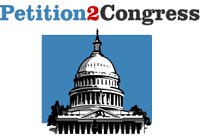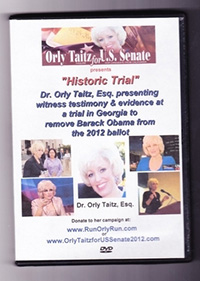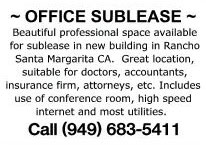Review of surreply by John Carlson
Posted on | October 1, 2009 | 1 Comment
Taitz files Surreply in response to Cardona
October 1, 2009 by John Charlton
EMPLOYS INCISIVE LEGAL ARGUMENTS AGAINST CARDONA’S DEFENSE OF USURPATION
by John Charlton
(Oct. 1, 2009) — Attorney Orly Taitz, esq. has filed a Surreply to acting Attorney General George S. Cardona’s arguments in defense of his own Motion to Dismiss in the case Captain Pamela Barnett et al. vs. Obama et al..
Dr. Taitz’s reply is an elegant and incisive legal argument against the points of law cited by Cardona, lead counsel for the Defense.
Attorney Cardona had attacked Taitz Opposition Brief by claiming that the Plaintiffs reliance on the 9th Amendment was misplaced. To this, Dr. Taitz counters in her Surreply, explaining that Cardona’s authorities in support of his claims are weak:
In support of this assertion, the Defendants cite not one single Supreme Court case, but instead a line of 9th Circuit Cases which goes back, ultimately, not to any text of the constitution itself, but to Lawrence H. Tribe’s 1998 textbook entitled American Constitutional Law. Tribe’s quoted statement concerning the Ninth Rule as a rule of constitutional construction inexcusably contradicts the Supreme Court’s repeated holdings (relevant to the construction of Article II, Sec. 1 qualifications for President, as well as the Ninth Amendment, both of great importance to the resolution of this case) that, “it cannot be presumed that any clause in the constitution is intended to be without effect.” Marbury v. Madison, 5 U.S. 137; 2 L.Ed. 60; 1 Cranch 137, 174 (1803). In interpreting the Constitution, “real effect should be given to all the words it uses.” Myers’ Administratrix v. United States, 272 U.S. 52, 151; 47 S. Ct. 21; 71 L. Ed. 160 (1926)(the Myers case addresses whether Congress may enact legislation withholding the removal power of executive branch officers from other branches of government, see below).
Then Dr. Taitz argues that there exists a more sound legal interpretation of the 9th Amendment, which has been accepted by the Supreme Court of the United States.
More consistent with the Federalist Papers and Marbury is the theory of the Ninth Amendment advanced by Professor Randy E. Barnett. Barnett takes the position that the Ninth Amendment operates as an active source of rights and cannot be “void where prohibited by law”. Plaintiffs submit that Barnett’s 2004 learned treatise Restoring the Lost Constitution: the Presumption of Liberty, published by the Princeton University Press, is both admissible and susceptible to judicial notice pursuant to FRE 803(18) and Plaintiffs ask this Court to take judicial notice of Barnett’s significant contribution to Ninth Amendment jurisprudence. Accordingly, Plaintiffs incorporate Barnett’s book by reference as if filed as a matter of record as supplemental argument in support of their contentions in this case.
Taitz then explains why Dr. Randy E. Barnett’s approach is more sound:
Based on the Ninth Amendment, Barnett proposes to reverse the modern trend by applying a philosophy of judicial review true to its Constitutional origins: a presumption of liberty, which questions every exercise of power. Barnett concedes the need for reasonable restrictions on some actions; for example, when such regulations “are shown to be necessary to prevent the future violation of rights of others.” When a court is faced with a hard case, he feels that in order for the rule of law to be maintained, society must accept the outcome even when the ending is not a “happy” one.
And then applies this view of the 9th Amendment to her case:
Such exactly is the case of Barnett v. Obama, a hard case whose proper result society must accept even if the ending is not a happy one, at least not for most of Obama’s supporters in the last election. In the present case, the need for reasonable regulation is that which was established in the Constitution, namely that the President must be a “natural born citizen” as that term was interpreted and understood at the time of the adoption of the Constitution, which incorporates Emmerich de Vattel’s “Law of Nations” as one of its own internally extrinsic sources (Article I, §8, https://www.constitution.org/vattel/vattel_01.htm). Plaintiffs also cite and rely upon Vattel’s Law of Nations, at the website cited above, and would both offer it into evidence under Rule 803(18) of the Federal Rules of Evidence, and ask the Court to take Judicial Notice of this ancient treatise as well, on the grounds that the definitions contained therein regarding Natural Born Citizen are those upon which this court must rely in deciding the present case.
Since the Defendants have cited a line of cases originating with a law professor’s textbook, however, there is no reason why Plaintiffs should not equally rely on legal academic texts, and Plaintiffs prefer the writings of Barnett to those of Tribe, and ask this Court to take judicial notice of Randy E. Barnett’s equally learned treatise published in 2004, along with his earlier law review article: “The Ninth Amendment and Constitutional Legitimacy,” 64 Chicago-Kent L. Rev. 37 (1988). The fundamental relevance of Barnett’s treatise on the Ninth Amendment is that where the Constitution creates a rule as clear as the citizenship requirements of Article II, the Court should presume and infer that the Ninth Amendment (taken together with the First Amendment “right to petition for redress of grievances) not merely affords guarantees a remedy belonging to the people and justiciable, and redressable in the courts. Defendants completely fail to address the First Amendment aspect of Plaintiffs’ rights to enforce the constitution, to enforce every clause and provision, including Article II, §1, Clause 5 re: “natural born” citizenship.
Taitz then shows how the 9th Amendment has been employed by the Supreme Court:
Even more significant than Barnett’s work, however, is the vitality of the Ninth Amendment as a key factor in the Supreme Court’s landmark 2008 District of Columbia v. Heller, 128 S.Ct. 2783; 171 L.Ed.2d 637 (2008). While the Ninth Amendment was indeed used in that case as an analogy for rule of construction and interpretation, the Court upheld the independence of the First, Fourth, and Ninth Amendments as sources of independent, individual power by writing: “All three of these instances unambiguously refer to individual rights, not “collective” rights, or rights that may be exercised only through participation in some corporate body.” 128 S.Ct. at 2790, 171 L.Ed.2d at 650.
D.C. v. Heller involves “substantive due process”, because it addresses substantive rights protected by the Constitution, even though the Fifth and Fourteenth Amendments are not precisely cited as central rules of decision in that case. When the Defendants, however, state at p. 1, ll. 22-24, and p. 2, ll. 2-7, that “…the Ninth Amendment does not independently create a constitutional right for purposes of stating a claim” and “the Ninth Amendment is ‘not a source of rights as such’”, the Defendants are ignoring the key role and importance of the Ninth Amendment in modern cases recognizing substantive due process rights starting with Griswold v. Connecticut, 381 U.S. 479; 85 S.Ct. 1678; 14 L.Ed.2d 510 (1965), wherein (according to a search on Lexis) the Ninth Amendment is cited 55 times (see especially the Ninth-Amendment centered concurrence of Justices Goldberg, Harlan, Brennan, and Earl Warren) at 381 U.S. 486, 85 S.Ct. 1682, 14 L.Ed.2d 516).
She then deftly employs the cases used by liberal progressives, to counter Cardona’s arguments about the 9th Amendment not being a basis for rights asserted by citizens:
As is well known, Griswold v. Connecticut stands as the starting point of a very long line of cases, including most notably Stanley v. Illinois, 405 U.S. 645; 92 S.Ct. 1208; 31 L.Ed.2d 551 (1972), Roe v. Wade, 410 U.S. 113; 93 S.Ct. 705; 35 L.Ed.2d 147 (1973); Planned Parenthood v. Casey, 505 U.S. 833; 112 S.Ct. 2791; 120 L.Ed.2d 674 (1992); Troxel v. Granville, 530 U.S. 57; 120 S. Ct. 2054; 147 L. Ed. 2d 49 (2000); and Lawrence v. Texas, 539 U.S. 558; 123 S.Ct. 2472; 156 L.Ed.2d 508 (2003).
In each of these cases (with the sole exception of Lawrence), the Ninth Amendment played a significant if not decisive role in conjunction with the Fifth and Fourteenth to establish a “broad statement […] of the substantive reach of liberty” (Lawrence, 539 U.S. at 564, 123 S.Ct. at 2476) into subjects such as contraception, abortion, sex generally, and family structure in particular regarding which there is no express language in the Constitution whatsoever. How much stronger is the inference that there is an actionable “liberty interest” under the First, Fifth, and Ninth Amendments in the enforcement of the expressly protective clauses of the Constitution e.g. the “natural born citizenship” requirements of Article II, Section 1?
Attorney Taitz then rebuts Cardona’s claim that her Opposition Brief did not address the redressability point of the standing doctrine, in context of his arguments on the Political Question doctrine, namely that the Courts cannot intervene in discretionary decisions of the executive and legislative branches:
Myers’ Administratrix, cited above, is another “root” case giving rise to a long line of cases, most notably Bowsher v. Synar, 478 U.S. 714, 106 S.Ct. 3181, 92 L.Ed.2d 583 (1986) and Morrison v. Olsen, 487 U.S. 654, 108 S.Ct. 2597, 101 L.Ed.2d 569 (1988). The relevance of these cases, concerning the removal of executive branch officials (all cases relating to officers lower than Cabinet level positions, and none having to do with the express terms of Constitutional eligibility of any particular officer), is—even assuming Defendants were correct that Congress had ever intended to deprive the judiciary of power to adjudicate the Constitutional eligibility of any elected officer—-whether Congress actually possesses the power to limit the removal of any executive branch official to itself by and through the impeachment process. The answer would seem to be a resounding “NO.”
“Congress cannot reserve for itself the power of removal of an officer charged with the execution of the laws except by impeachment. To permit the execution of the laws to be vested in an officer answerable only to Congress would, in practical terms, reserve in Congress control over the execution of the laws.”
Bowsher v. Synar, 478 U.S. 714, 726, 106 S.Ct. 3181, 3187-88, 92 L.Ed.2d 583, 596 (1986), and Morrison v. Olson, 487 U.S. 654, 685-6; 108 S.Ct. 2597; 101 L.Ed.2d 569, 602 (1988).
The Supreme Court in Morrison took the extra step, relevant to the present case, of evaluating the role of the judiciary in the separation of powers doctrine:
“While the Constitution diffuses power the better to secure liberty, it also contemplates that practice will integrate the dispersed powers into a workable government. It enjoins upon its branches separateness but interdependence, autonomy but reciprocity.”
Youngstown Sheet & Tube Co. v. Sawyer, 343 U.S. 579, 635 (1952) (concurring opinion). 487 U.S. at 694, 108 S.Ct. at 2620-2621, 101 L.Ed.2d at 607.
Dr. Taitz then rightly points out that the Federal Courts have power regarding cases of usurpation, esp. that committed by the individual holding the office of President:
The Morrison Court’s citation to Youngstown is extremely significant, because Youngstown was a case focusing on Presidential abuse of power and usurpation of authority without recent historical parallel, until approximately January 21, 2009.In Youngstown, the Supreme Court affirmed the power of a District Court to enjoin unconstitutional usurpation of power (and seizure of property) by the American President Harry S. Truman. Youngstown stands for the proposition that unconstitutional acts on the part of the President can be enjoined by a District Court. So the Plaintiffs’ injuries are judicially redressable: under Youngstown the Court can, at the very least, enjoin President Barack Hussein Obama from acting in the absence of constitutional authority to do so. Under Bowsher and Morrison, the Court can review the President’s qualifications for office and remove him if good cause be shown which would reaffirm the constitutional ethics and standards underlying the legitimacy of the Presidency. Those cases, obviously, concerned the removal of inferior officers, but the logic of separation of powers dictates that ONLY the Article III judiciary, as the final refuge repository of the sovereignty of the people can possibly supervise and review the constitutional qualifications and legitimacy of the President on behalf of the people.
The President cannot be held to be an impartial or dispassionate judge of his own qualifications. In fact, the January 21, 2009, executive order sealing all of President’s archival and personal records, previously submitted in this case, was, like the order seizing steel mills in Youngstown, an order unsupported by any authority deriving either from the Constitution nor any Congressional statute:
“The President’s order does not direct that a congressional policy be executed in a manner prescribed by Congress — it directs that a presidential policy be executed in a manner prescribed by the President.” 343 U.S. at 588, 72 S.Ct. at 867, 96 L.Ed. at 1168 (1952).
And then applies the decision in the Youngstown case to Obama’s usurpation of office:
Like the unconstitutional usurpation and exercise of power in Youngstown, Barack Hussein Obama’s usurpation of the Presidency must be condemned for its arrogant disregard of the Constitution.Again using the insertion of paraphrasis from this critical case in brackets:
“It cannot be contended that the President would have had power to issue this [or any] order [or even to assume power at all] had [the Constitution] explicitly negated such authority in formal [language]. [And yet in fact, the Constitution] has expressed its will to withhold this power from the President [because] it [says] so in so many words. The authoritatively expressed purpose of [the Constitution] to disallow such … [a] President [to accede to power]. . . . could not be more decisive . .” Id. at 343 U.S. 602, 72 S.Ct. 893, 96 L.Ed. 1175.
She then argues that since her Plaintiffs are tax payers, the Flast vs. Cohen case gives them grounds to argue that Obama’s usurpation does require them to undertake unconstitutional actions:
Each and every Plaintiff in this lawsuit is at the very least a taxpayer and a citizen. The expenditure of funds by a President who is not constitutionally qualified is a new requirement imposed on the people of the United States. It is a clear and material change in the terms in the social contract (as well as the actual employment contract of all oath-taking officers and enlisted men and legislators who have sworn to uphold that Constitution) that a President can come into office, seal his records, and disclose nothing about his past or origins once they are challenged.
Accordingly, in response to the Defendants Reply on page 4, ll. 9-17, Plaintiffs can and do allege that the Defendants have imposed upon the Plaintiffs a new, specific, and unconstitutional action that they are required to take in violation of their First Amendment right to petition for proof of constitutional eligibility and their Ninth Amendment reservation of sovereignty, and of the power to uphold the Constitution and see that the laws are faithfully executed by their delegate and trustee, the President of the United States. The point of allowing Flast v. Cohen taxpayer standing is precisely to correct the failures of the political system to abide by the plain letter and strictures of the Constitution. The challenge of what constitutes a “political question” immune from judicial review remains, in Plaintiffs’ eyes, quite simple: non-justiciable political questions are those where a policy choice and decision has been made within the Constitutional framework: e.g., to appropriate and allocate funds for additional nuclear submarines or a new national park. There is no political question involved in whether or not to enforce the First Amendment separation of Church and State, it is strictly a matter of constitutional construction and application. There is no political question involved in whether or not to enforce the natural born citizenship requirements of Article II.
Attorney Taitz then rebuts the circular argument of Cardona, that the eligibility question is a political one, therefore not in the hands of the Courts, but of Congress, which refused to act constitutionally:
Exhibit A shows a letter from Senator Sessions from Alabama states that the senator cannot get involved in the matter of eligibility due to the fact that the legal actions were pending and ethics requirements prevent him from getting involved in legal matters. Now the government is stating that the judiciary cannot address this issue because it is a political issue and it needs to be resolved by the senators and congressmen, the same senators and congressmen that didn’t want to get involved in the first place because it is up to the judiciary. Absurdity of this argument is clear. As Senator Sessions states his letter- legal matters need to be resolved by the judiciary. Similarly Exhibit B shows quo warranto request filed with the attorney general Eric Holder on March 1. Mr. Holder never responded in the period of seven months.
Dr. Orly Taitz then rebuts Cardona’s claims that FOIA standing has not been achieved:
In essence, there is a question of material fact regarding the sufficiency of Plaintiffs’ allegations regarding compliance with the pre-requisites for suit under FOIA. Captain Pamela Barnett has fulfilled the requirements in form and function. FOIA is basically a form of inquiry designed to make private party investigations into the Federal government easier and more accessible. More important, however, in light of the executive orders entered on January 21, 2009, all proper FOIA requests, like all other requests were and are FUTILE so long as the President’s executive orders are allowed to stand (see footnote above).But in practical effect and function, the undersigned counsel’s numerous requests for information, including her letter to U.S.A.G. Eric Holder and the Secretary of State of Kentucky (Exhibit C) constituted massive pre-filing diligence on the part of counsel. Plaintiffs ask the real Congressional purpose in enacting FOIA, to open the doors or narrow the path to information? Plaintiffs contend that they are entitled to use their year of investigations as the practical formal substitute and functional equivalent of a formal FOIA requests originating in Orange County, and that the failure to fill out specific forms should not defeat the right to know.
She concludes by citing the relevance of the multiple SSNs to election fraud, and the implicit admission of standing for military plaintiffs made by Judge Clay D. Land’s denial of Rhodes’ request for a stay of deployment.
Posted in Law Cases, Politics | Tagged 9th Amendment rights, Attorney George Cardona, Bowsher v. Synar, Captain Pamela Barnett vs Obama, District of Columbia v. Heller, Dr. Orly Taitz, Emmerich de Vattel, Eric Holder, Flast vs. Cohen, FOIA, Griswold v. Connecticut, Law of Nations, Lawrence H. Tribe, Lawrence v. Texas, Marbury vs. Madison, Morrison v. Olson, Myers’ Administratrix, Quo warrento, Randy E. Barnett, Youngstown Sheet & Tube Co. v. Sawyer | No Comments Yet
Comments
One Response to “Review of surreply by John Carlson”












 29839 Sta Margarita Pkwy,
29839 Sta Margarita Pkwy, 
 Videography by Barbara Rosenfeld
Videography by Barbara Rosenfeld 


October 3rd, 2009 @ 2:47 pm
Dr. Taitz,
I beleive that Amendment 10 to the Constitution gives to the people , power
to ask Obama to prove he is qualified to be President under the Constistution article 2 sect 1.
Amendment 10 – Powers of the States and People. Ratified 12/15/1791. Note
The powers not delegated to the United States by the Constitution, nor prohibited by it to the States,
are reserved to the States respectively, or to the people.
The constitution sates what the qualifications are to be president, but it does not specify what or who has the
power to require verification.
Therefore the people have the power to require verification, because of the 10th amendment .
The argument over standing is invalidated by Amendment 10 to the Constitution
Therefore You win Obama loses!
From Wikkepedia:
https://en.wikipedia.org/wiki/Tenth_Amendment_to_the_United_States_Constitution
The Tenth Amendment (Amendment X) of the United States Constitution, which is part of the Bill of Rights, was ratified on December 15, 1791. The Tenth Amendment restates the Constitution’s principle of federalism by providing that powers not granted to the national government nor prohibited to the states are reserved to the states or the people.
Contents
[hide]
1 Text
2 History and case law
2.1 Forced participation or commandeering
2.2 Commerce clause
2.3 Federal funding
3 State sovereignty resolutions and nullification acts
4 Footnotes
5 External links
[edit] Text
“ The powers not delegated to the United States by the Constitution, nor prohibited by it to the States, are reserved to the States respectively, or to the people. ”
[edit] History and case law
The Tenth Amendment is similar to an earlier provision of the Articles of Confederation: “Each state retains its sovereignty, freedom, and independence, and every power, jurisdiction, and right, which is not by this Confederation expressly delegated to the United States, in Congress assembled.”[1] After the Constitution was ratified, some wanted to add a similar amendment limiting the federal government to powers “expressly” delegated, which would have denied implied powers.[2] However, the word “expressly” ultimately did not appear in the Tenth Amendment as ratified, and therefore the Tenth Amendment did not amend the Necessary and Proper Clause.
The Tenth Amendment, which makes explicit the idea that the federal government is limited only to the powers granted in the Constitution, is generally recognized to be a truism. In United States v. Sprague (1931) the Supreme Court noted that the amendment “added nothing to the [Constitution] as originally ratified.”
From time to time states and local governments have attempted to assert exemption from various federal regulations, especially in the areas of labor and environmental controls, using the Tenth Amendment as a basis for their claim. An often-repeated quote, from United States v. Darby, 312 U.S. 100, 124 (1941), reads as follows:
The amendment states but a truism that all is retained which has not been surrendered. There is nothing in the history of its adoption to suggest that it was more than declaratory of the relationship between the national and state governments as it had been established by the Constitution before the amendment or that its purpose was other than to allay fears that the new national government might seek to exercise powers not granted, and that the states might not be able to exercise fully their reserved powers…..
see the rest by clicking the wikkepedia link.
Tony Palmieri